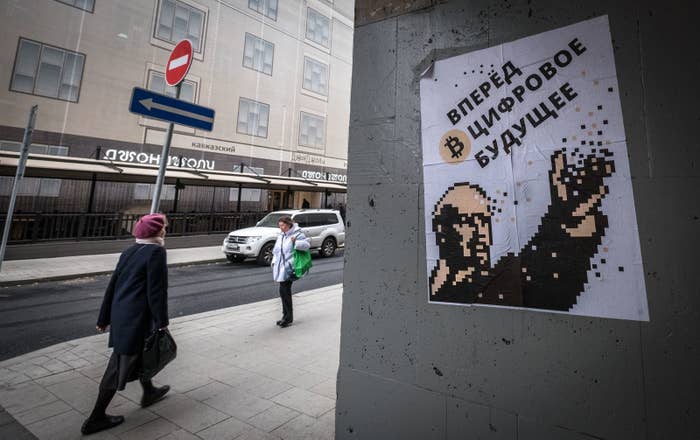
As bitcoin sees its value skyrocket, some financial experts and cyber analysts are beginning to worry that the digital cryptocurrency is prime to be exploited by countries like Russia looking to dodge US sanctions.
William Browder, a financier and cofounder of an investment fund that specializes in Russia, will say as much when he testifies on Thursday before the US Helsinki Commission, a government agency that monitors security and human rights policy in Europe.
“These cryptocurrencies are a gift from God to criminals and dictators who want to keep their money safe,” said Browder in a phone interview on Tuesday.
In his prepared statement, provided to BuzzFeed News, Browder calls for “the urgent attention of the U.S. and other Western governments in relation to Magnitsky sanctions as well as all other sanctions programs.” Sergei Magnitsky, for whom the sanctions are named, was working for Browder’s firm to investigate Russian corruption when he was arrested and imprisoned. He later died in prison, prompting the US to pass the Magnitsky Act, which sanctions individual Russian human rights abusers.
The warning was made all the more timely by a statement from Sergei Glazyev, an aide to Russian President Vladimir Putin, who said Tuesday that there was an “objective need” for cryptocurrencies, given that Russian banks are subject to US sanctions, according to a report in the Russian-language Rambler News Service.
Cryptocurrencies have gained mainstream attention over the last year as the valuation of bitcoin and others has soared. The digital tokens are backed by encrypted blockchain technology and allow users to conceal their identities when buying or selling the currency, providing a means for criminals and other sanctioned entities to do business outside the global financial system. WikiLeaks is a well-known user of cryptocurrency and North Korea is believed to have made at least three attempts to steal bitcoins from South Korean currency exchanges, according to a September report from FireEye, a cybersecurity company. In Venezuela, where sanctions and rampant inflation have rendered the bolivar almost useless, President Nicolás Maduro said last week that the government would create its own digital currency, to be called the petro.
The cyberthreat actor Fancy Bear, also known as APT 28, has also used bitcoin to register website domains for their command and control structure, Luke McNamara, who wrote the September FireEye report, told BuzzFeed News. The US intelligence community has determined that Fancy Bear, which is believed to be connected to the Russian intelligence services, was behind the 2016 hack of the DNC’s network.
“It’s the perfect tool for, not just for criminals, as we mentioned for nation-states and for sanctioned organizations to move funds openly around the world bypassing credibly established financial systems” said Andrei Barysevich, director of advanced collection at Recorded Future. “It will be incredibly challenging for US authorities and international authorities to prove that money transfer was initiated by one of the sanctioned entities.”
When asked about whether the US government is concerned about the chance Moscow could use bitcoin to dodge sanctions, the response from the Treasury Department was cautious. “While Treasury does not comment on investigations or telegraph prospective actions, we will continue to use our authorities to maintain pressure on Russia,” a Treasury official told BuzzFeed News in an email. “As we see evidence of sanctionable conduct or attempted evasion of our sanctions, we will take action as appropriate.”
Despite the cryptocurrency’s potential, Barysevich and others were quick to point out that there are still a number of obstacles to the use of bitcoin for large-scale transfers.
Cashing out of the system is still complicated. “It is possible for smart analysts to figure out, using some outside clues, who is behind a certain transaction,” said Elizabeth Rosenberg, a senior fellow at the Center for New American Security and former senior adviser at the Treasury Department.
Regulators closely monitor the transfers of virtual currencies into cash, and any currency exchange that operates in dollars would be subject to US regulations. Some exchanges also limit the amount of money that can be bought and sold at one time, hampering the transfer of large sums.
There is also, put simply, a limited amount of cryptocurrency currently available.
“We’re still talking about a currency whose total market capitalization is only about $250 billion, which is, surprisingly, still just a drop in the bucket of the global economy and the kind of money we see people moving across borders,” said Peter Van Valkenburgh, director of research at Coin Center, a nonprofit focused on policy issues related to cryptocurrencies. “I still remain quite confident that the correspondent banking system and shady real estate deals for Manhattan apartments that no one lives in are much better ways of moving wealth against sanctions laws.”
Bitcoin is the most popular virtual currency, but many others have been developed, and they offer varying levels of privacy. In May 2017, a ransomware bug called WannaCry, which the NSA linked to North Korea, affected computers worldwide. McNamara told BuzzFeed News that the thieves transferred bitcoin into another virtual currency called Monero, which obscures payment details, in order to further conceal the path of the funds.
As new currencies are developed, the technology will shift and it may become more difficult to follow the money. For now, the hassle may still be more than it’s worth to countries trying to fleece US investigators — but that could change in the near future.
“It’s an issue that’s interesting and potentially significant, but still a horizon issue,” said Rosenberg. Current uses are “still quite small relative to the potential that we see in the future as these virtual currencies evolve.”
“To be frank, the tech entrepreneurs are way ahead of the regulators, way ahead of the regulators. And that’s not a great thing,” said Rosenberg.
